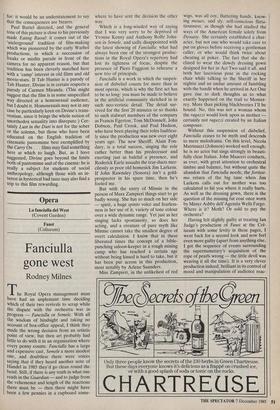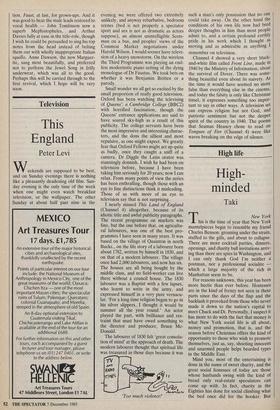Opera
Faust (Coliseum)
Fanciulla gone west
Rodney Milnes
The Royal Opera management must have had an unpleasant time deciding which of their two revivals to scrap while the dispute with the orchestra was in progress — Fanciulla or Semele. With all the wisdom of hindsight and taking no account of box-office appeal, I think they made the wrong decision from an artistic point of view, but then art probably had little to do with it in an organisation where every penny counts. Fanciulla has a large and expensive cast, Semele a more modest one, and doubtless there were voices saying that if they heard another note of Handel in 1985 they'd go clean round the bend. Still, if there is any truth in what one reads in the Guardian — and to judge from the vehemence and length of the reactions there must be — then there might have been a few pennies in a cupboard some- where to have sent the decision the other way.
Which is a long-winded way of saying that I was very sorry to be deprived of Yvonne Kenny and Anthony Rolfe John- son in Semele, and sadly disappointed with the latest showing of Fanciulla: what had always been one of the strongest produc- tions in the Royal Opera's repertory had lost its tightness of focus, despite the presence of Piero Faggioni to rehearse a new trio of principals.
Fanciulla is a work in which the suspen- sion of disbelief counts for more than in most operas, which is why the first act has to be so long: you must be made to believe in the artificial community sketched in in such neo-veristic detail. The detail sur- vived for the first 20 minutes or so thanks to such stalwart members of the company as Francis Egerton; Tom McDonnell, John Dobson, Paul Crook, and Paul Hudson, who have been playing their roles faultless- ly since the production was new over eight years ago. The new Sheriff, Alain Fon- dary, is a total success, singing the role rather better than his predecessor and exerting just as baleful a presence, and Roderick Earle assaults the tear-ducts mer- cilessly as poor old homesick Jim Larkens. If John Rawnsley (Sonora) isn't a gold- prospector in his spare time, then he's fooled me.
But with the entry of Minnie in the person of Mara Zampieri things start to go badly wrong. She has so much on her side — spirit, a huge spinto voice and fearless- ness in her use of it, variety of tone colour over a wide dynamic range. Yet just as her singing lacks spontaneity, so does her acting, and a creature of pure myth like Minnie cannot take the smallest degree of overt calculation. I know that in these liberated times the concept of a bible- punching saloon-keeper in a rough mining camp who has reached a certain age without being kissed is hard to take, but it has been put across in this production, most notably by Arlene Saunders.
Miss Zampieri, in the unlikeliest of red wigs, was all coy, fluttering hands, know- ing moues, and sly, self-conscious flirta- tiousness, as though she had studied the ways of the American female solely from Dynasty. She certainly established a char- acter, but not one who would take care to put on gloves before receiving a gentleman caller, or who would think twice about cheating at poker. The fact that she de- clined to wear the dowdy dressing gown designed for her in Act Two said it all, and both her lascivious pose in the rocking chair while talking to the Sheriff in her nightie and an undue amount of fumbling with the bandit when he arrived in Act One gave rise to dark thoughts as to what exactly happened on the trail to Monter- rey. More than picking blackberries I'll be bound. No, this was not a woman whom the ragazzi would look upon as mother certainly not ragazzi created by an Italian composer.
Without this suspension of disbelief, Fanciulla ceases to be myth and descends to mere melodrama. On this level, Nicola Matrinucci (Johnson) worked well enough; he is no actor but sings strongly in beauti- fully clear Italian. John Mauceri conducts, as ever, with great attention to orchestral timbre and balance, but without quite the abandon that Fanciulla needs; the fortissi- mo return of the big tune when Jim Larkens calls out for mother was too calculated to hit you where it really hurts. As well as the dressing gown, there is the question of the missing fur coat once worn by Mister Ashby dell'Agenzia Wells Fargo. Where is it? Moth? Or sold to pay the orchestra?
Having felt slightly guilty at treating Ian Judge's production of Faust at the Col- iseum with some levity in these pages, I went back for a second look and now feel even more guilty (apart from anything else, I got the sequence of events surrounding the supernumerary's acquisition of the rope of pearls wrong — the little devil was wearing it all the time). It is a very clever production indeed, brilliant in its control of mood and manipulation of audience reac- tion. Faust, at last, for grown-ups. And it was good to hear the male leads restored to vocal health — John Tomlinson now a superb Mephistopheles, and Arthur Davies fully at ease in the title-role, though I wish he could be persuaded to sing his top notes from the head instead of belting them out with wholly inappropriate Italian squillo. Anne Dawson, the new Marguer- ite, sang most beautifully, and preferred not to perform the Jewel Song in frilly underwear, which was all to the good. Perhaps this will be carried through to the first revival, which I hope will be very soon.



































































 Previous page
Previous page